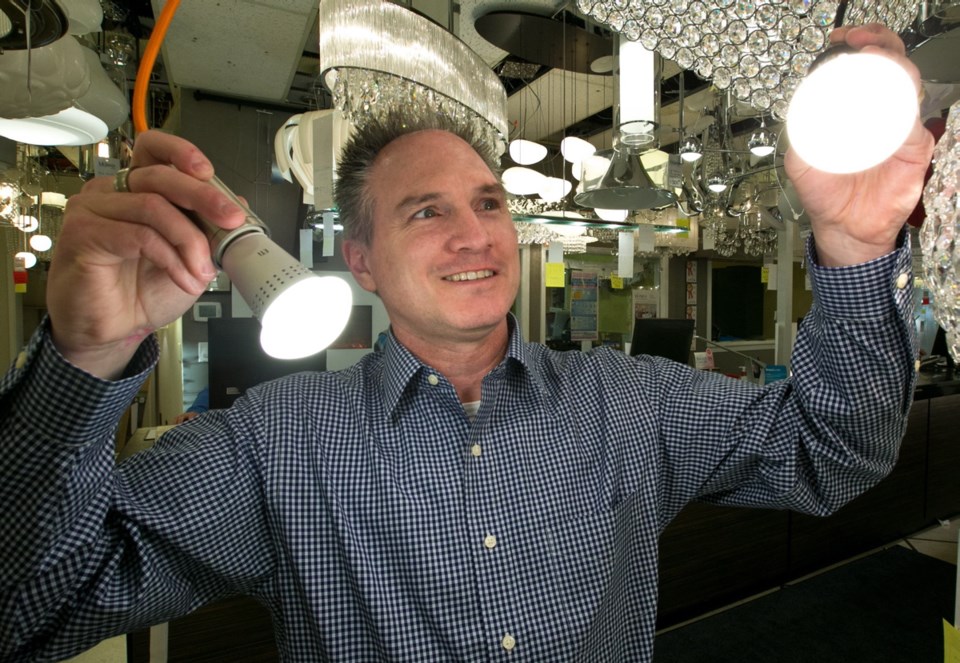Flick a switch and the light goes on.
Simple, right?
Not for everyone.
Canadians are puzzling over federal rules governing the type of light bulbs that stores can sell and wondering what’s next.
Some retailers say consumers are confused about what type of light bulbs the federal government is talking about.
First of all, relax. Nothing is changing immediately for capital region residents. That’s because B.C. already moved in 2011 to restrict sales of 75- and 100-watt traditional incandescent bulbs.
The rest of the country is now catching up with us.
Federal regulations in effect as of Jan. 1 require all provinces to phase out sales of those higher-wattage incandescents to promote more energy-efficient lighting. Light emitting diode bulbs (LEDs), incandescent halogen gas bulbs and compact fluorescent bulbs (CFLs) can stay on store shelves.
Coming up next is a federal restriction this December on sales of the popular 60-watt and on 40-watt incandescent bulbs. This will put Canada and the U.S. on the same page for lighting standards.
It also gives Greater Victoria residents at least a year to prepare to switch over.
But here’s the sticking point — the cost of the traditional incandescents is rock-bottom. A box of four sells for just $1.49 at some major hardware and big-box chains in the region. Retailers say the low price is why consumers continue to buy them.
In 2011, some capital region residents panicked and stocked up on incandescents, spending hundreds of dollars at a time.
Individual light emitting diode bulbs can run from $12 and up.
A manager of one local hardware chain is already a fan of long-lasting LEDs, saying the quality of light is “excellent. “I’m going to start changing over my house probably within the next few months.”
Although sales of traditional incandescent bulbs will come to an end, some types of incandescents will still be permitted to be sold, such as small lights for vanity mirrors.
LEDs and bulbs with halogen gas do not have mercury in them, while CFLs contain a small amount of mercury, which is toxic.
Halogen bulbs are low cost and have a lifespan similar to a traditional incandescent, typically about 1,000 hours.
The federal government sought public comment until last month about the use of halogen bulbs.
The change to new types of lighting has led to continual technological improvements, particularly with LEDs, said Dave Finnigan, general manager of the family-owned Mclaren Lighting, 3400 Douglas St. The colour of light, the output of light and their longevity with premium LEDs has advanced considerably and continues to do so.
A good-quality LED can run 30,000 to 50,000 hours or more. One product Mclaren carries comes with a lifetime warranty, he said.
However, there are some inadequate LED products in the market, Finnigan said. “It’s a bit like the Wild West right now. People do need to do their research and be a bit cautious. You are spending a few dollars, so you do need to get the right bulb.”
Mclaren Lighting has LEDs on display so customers can check them out, he said. “You need to see them working.”
The next stage in the evolution in LEDs is underway as manufacturers produce light fixtures with built-in LED modules, said Finnigan. He carries fixtures that allow those modules to be replaced.
New rules and recycling for light bulbs
- To find out where to take your light bulbs when their life is over, go to lightrecycle.ca
- The Recycling Council of B.C.'s website, rcbc.ca/recyclepedia, shows recycling locations
- In the Victoria area, residents can take light bulbs to the Capital Regional District’s Hartland recycling facility. Residents also have have a choice among a number of private companies. Hartland information is at crd.bc.ca/service/waste-recycling.
- Natural Resources Canada: nrcan.gc.ca/energy/regulations-codes-standards/6847
- B.C. Hydro: tiny.cc/bchydro-lights



